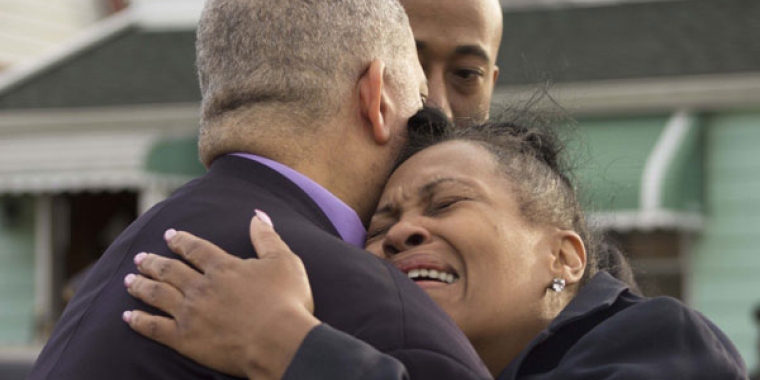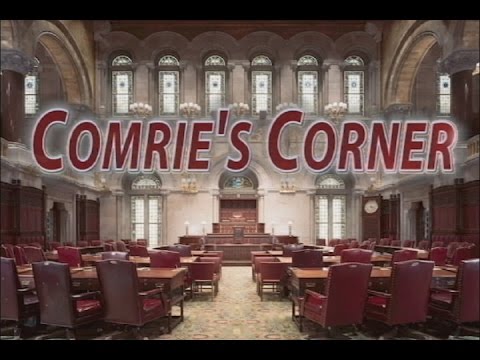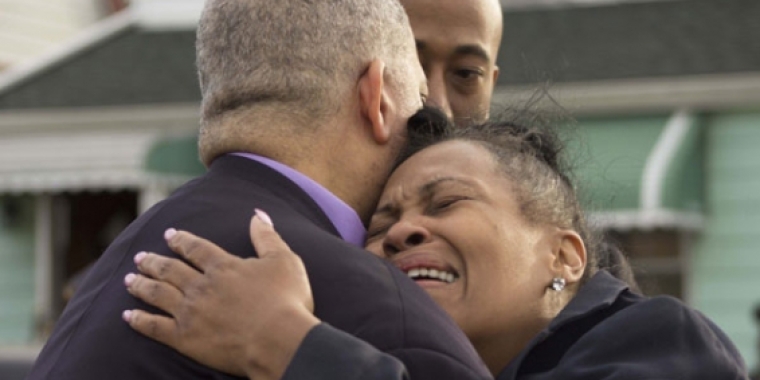
Thousands of NYC Seniors, Including 101-Year-Old Queens Veteran, Saved From Rent Increases
Stacey Eliuk
June 29, 2015
-
ISSUE:
- Housing
- Seniors
- Disability
Julius Diamond is a 101-year-old World War II Veteran on a fixed income. Raised as an orphan in Brooklyn, New York, Mr. Diamond spent his life working as a dress cutter before coming to Queens to retire with his wife of sixty years in Forest Hills. Mr. Diamond has benefited from a program known as SCRIE for decades, or the Senior Citizen Rent Income Exemption. This program, created in 1970, was established to prevent rent increases for low-income seniors in certain types of housing across New York City. Tenants eligible for this benefit would be at least 62 years old, and reside in an apartment that was rent stabilized or controlled. Prior to 2014, income eligibility for the program was capped at $29,000 annually; that amount was increased to $50,000 in 2014 as part of an effort to make New York City more affordable for its elderly. Under the program’s guidelines, more than one-third of an individual’s income must go towards yearly rental payments, with landlords paid the difference between the actual and frozen rents by the City in the form of a property tax credit. On average, rents are frozen at $755 per month, and save the typical household up to $3,000 a year. A similar program, the Disability Rent Increase Exemption or DRIE, assists the disabled in a similar fashion.
For Mr. Diamond and tens of thousands of New Yorkers like him who have been provided invaluable relief from rising rents across the City from SCRIE, DRIE and other programs, a loss in eligibility has the potential to be financially devastating.
At the end of 2013, Mr. Diamond received a one-time income increase just as his SCRIE benefits were expiring, days before the State increased the income eligibility cap to $50,000 in 2014. The centenarian continued to pay his frozen rent for the following year at the same rate until the City informed him that he owed his landlord thousands of dollars in back-rent based on his new income, despite it being only a one-time increase. Mr. Diamond could not afford to pay.
His situation was brought to the attention of State Senator Comrie (D-Hollis) by Borough President Melinda Katz. Senator Comrie pledged to help Mr. Diamond, and introduced S5465, legislation granting Mr. Diamond eligibility for a senior citizen rent increase exemption at his previously frozen rent amount. However, researching the issue at hand led Senator Comrie to some of the larger issues regarding SCRIE, DRIE and similar supplemental programs.
In 2014, thousands of seniors and disabled New Yorkers who applied and were granted rent freezes through the New York City Department of Finance learned that a computer glitch miscalculated their program qualification. These applicants, who were already enjoying the benefits of the program, only learned about the mistake when notified by the City that they’d have to pay thousands of dollars in back rent as a result.
Upon coming to an understanding of the broad reach of this problem, Senator Comrie partnered with Senator Diane Savino (IDC-Staten Island/Brooklyn) to pass a piece of omnibus legislation (S.5721A) on June 17th, 2015 grandfathering into the program the thousands of guideline-following applicants who the City had approved. Also included in the legislation were provisions for Mr. Diamond, giving Mr. Diamond back the benefits he had before his income level changed, given that he still remains SCRIE eligible. It would also satisfy all arrears that were incurred due to his inability to pay.
"For Mr. Diamond and thousands of New Yorkers relying on SCRIE, DRIE and other supplemental programs, a loss in eligibility is literally a matter of survival: the difference between putting food on the table or a roof over your head," said State Senator Leroy Comrie. "All New Yorkers should have a right to the highest quality of life, and we as elected officials have a responsibility to deliver on that: to ensure our most vulnerable never have to barter between necessities just to remain in this City. I am humbled by this opportunity to serve, and commend Senator Savino and my colleagues in government for their partnership in fighting for justice for Mr. Diamond and those like him."
“Mr. Diamond and thousands of other elder or differently-abled New Yorkers on fixed incomes rely on SCRIE and DRIE to help them to remain in their homes,” said Queens Borough President Melinda Katz. “Many, many constituents – most of whom don’t necessarily have a Plan B – were terribly fearful upon learning that SCRIE and DRIE benefits were in jeopardy. Thankfully, our state legislators have come through on protecting these programs.”
“Our seniors and disabled New Yorkers who live on fixed incomes, deserve to live in their communities without the fear of losing their apartments. Many of our senior citizens choose to age in place in the neighborhoods where they’ve raised their families, worked and enjoyed throughout their lives. I’m so proud that this legislation keeps in place the higher income eligibility level for the SCRIE and DRIE programs without a sunset provision, reflecting the fixed incomes of more senior and disabled New Yorkers,” said Senator Savino.
The bill also passed through the Assembly and awaits the Governor’s signature.
###
related legislation
Share this Article or Press Release
Newsroom
Go to Newsroom
Comrie's Corner—March 29, 2017
March 30, 2017


